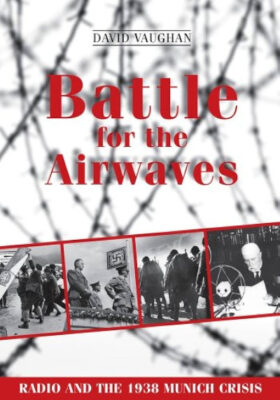Battle for the Airwaves
2008, Radioservis and Cook Communications
Battle for the Airwaves looks at the Munich crisis as it played out on the radio stations of Czechoslovakia, Germany, Britain and the United States. Drawing on the extensive and long-forgotten archives of Czech Radio, as well as archives in Germany, Britain and the US, David Vaughan reveals radio’s key role in the run-up to the Munich Agreement and beyond.

You could read Mr Vaughan’s book, substituting ex-Soviet countries such as Estonia for Czechoslovakia. With Kremlin talk of “privileged interests” in Russia’s neighbourhood and a litany of real and imagined grievances there, it is easy to imagine a resurgent Russia, whipping up its millions of compatriots, living in foreign countries thanks to the collapse of the Soviet empire, into a frenzy while the outside world stands aloof. These stranded Russians tune almost exclusively into the Kremlin-run electronic media, not local stations, which broadcast poorly in Russian, if at all (the same mistake that Czechoslovakia made with German). The lesson of the 1930s is that, once you lose hearts and minds, and malefactors gain them, everything else usually goes too.
As David Vaughan points out in his meticulous and poignant study of the war on the airwaves, Czechoslovakia’s own German-language programmes were hopelessly outgunned by the quantity, quality and audibility of the Nazi propaganda effort.
This is a story of propaganda and counter-propaganda, of censorship and self-censorship. By recounting the ways in which radio was used by Josef Goebbels and his aggressive Nazi propaganda machine, by British Prime Minister Neville Chamberlain and a compliant BBC, and by the beleaguered Czechoslovak government, the author shows how radio had for the first time become a central factor in international diplomacy, and a tool that could not be ignored.
Radio made the crisis immediate: the threat of war was brought directly into the homes of listeners as they were fed with Nazi sloganeering, Chamberlain’s soundbites (“peace in our time”), measured Czechoslovak pleas, and live reports from correspondents in Berlin, Prague, London and Munich. Indeed, the 1938 battle for the airwaves was one of the first global media events, marking the beginning of the age of the modern electronic media.
It is also a story of personal courage and technical innovation. Vaughan’s insightful account of the Munich crisis gives voice to those German-speaking citizens of Czechoslovakia who remained loyal to their country in defiance of Nazi Germany, to Czech radio reporters who grasped the severity of the situation while their managers failed to stand up to the Nazi propaganda onslaught, and to the small band of foreign, mostly American, radio correspondents who went to great lengths to get their reports on air.
Battle for the Airwaves: radio and the 1938 Munich crisis is a unique contribution to the historiography of the immediate pre-war period, combining as it does an insight into the relationship between the respective governments and their national media with a commentary on the development of radio broadcasting. It adds to our understanding of the political dynamics of the time, and serves as a reminder of the perils inherent in the relationship between the state and the media – be it by way of overt control, self-censoring compliance or inertia.
The book includes a CD with extracts from archive broadcasts from the time of the Munich Crisis.